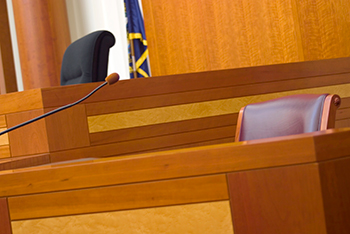 July 31, 2014 – The Wisconsin Supreme Court, in a 5-2 majority (with one concurrence), affirmed the court of appeals in applying a harmless error review to a circuit court’s refusal to let a defendant testify on her own behalf at trial, finding that the trial court’s denial was a harmless error.
July 31, 2014 – The Wisconsin Supreme Court, in a 5-2 majority (with one concurrence), affirmed the court of appeals in applying a harmless error review to a circuit court’s refusal to let a defendant testify on her own behalf at trial, finding that the trial court’s denial was a harmless error.
In State v. Nelson (2014 WI 70, July 16, 2014), the supreme court affirmed the court of appeals in determining that harmless error review applies to the Eau Claire Circuit Court’s denial of Angelica Nelson’s right to testify at her own trial. It further found that given the nature of Nelson’s defense and the overwhelming evidence of her guilt, the circuit court’s error was harmless beyond a reasonable doubt.
Nelson was charged with and convicted of three counts of sexual assault of a child for having sexual intercourse with a 14-year-old boy, D.M. Nelson was 18 at the time and a friend of the victim’s family. D.M.’s mother, Tamyra, had heard rumors about Nelson and D.M. so Tamyra sent a text message to Nelson and asked her if she had had sex with D.M. Nelson responded, “You’re going to be mad at me; but yes, I did.” Tamyra reminded Nelson that D.M. was a child, and Nelson texted back, “I know there [are] laws, but he’s hot and I’m sorry.”
Tamyra called the police. When Officer Brown, arrived, Tamyra was on the phone with Nelson. Tamyra placed the call on speaker, and Officer Brown overheard Nelson admit to having sexual intercourse with D.M. at least three times. Officer Brown then interviewed D.M., who admitted he had had sex with Nelson on three consecutive days, and that it was Nelson’s idea. Nelson admitted to police that she had sexual intercourse with D.M., whom she knew to be 14 years old, on three occasions, and that it was D.M.’s idea.
At trial, Judge Gabler asked Nelson’s attorney if Nelson wanted to testify. Nelson said that she did. Judge Gabler engaged Nelson in a colloquy about waiving her right against self-incrimination, which Nelson said she understood. Judge Gabler then asked Nelson about the substance of her testimony. She said that she wanted to “tell what actually happened,” which was that she did not unbuckle D.M.’s pants and that the assaults did not happen three days in a row. Judge Gabler explained that this testimony had no bearing on the elements of the offense. The court then found that Nelson was not “intelligently and knowingly waiving her right against self-incrimination because she wants to testify to things that are completely irrelevant to the two things the State has to prove.”
The jury convicted Nelson on all three counts. Nelson filed a motion for post-conviction relief, asserting the court violated her constitutional right to testify on her own behalf and that a new trial was required. The circuit court denied Nelson’s motion, and the court of appeals affirmed. The supreme court granted Nelson’s petition for review.
Analysis
A criminal defendant has a personal, fundamental right to testify which originates from several constitutional provisions, including the Fourteenth, Sixth, and Fifth Amendments. To ensure a “defendant is knowingly, intelligently, and voluntarily waiving his or her right to testify,” the court must conduct a limited colloquy regarding whether the defendant is aware of his or her right against self-incrimination. In this case, the state does not dispute that the circuit court erred in denying Nelson the right to testify, therefore the supreme court assumed, without deciding, that error occurred and only analyzed whether that assumed error should result in a new trial.
 Deborah Spanic, Marquette 2004, is a guest writer for the State Bar of Wisconsin. She can be reached by email.
Deborah Spanic, Marquette 2004, is a guest writer for the State Bar of Wisconsin. She can be reached by email.
In the majority opinion, Justice Roggensack wrote, “An otherwise valid conviction should not be set aside if the reviewing court may confidently say … that the constitutional error was harmless beyond a reasonable doubt.”
The supreme court first had to determine if the denial of a defendant’s right to testify is subject to harmless error review. There are two types of errors: trial errors and structural errors. Trial errors occur during the presentation of the case to the jury and their effect may be quantitatively assessed in the context of other evidence presented to determine whether they are harmless beyond a reasonable doubt. Structural errors affect the framework within which the trial proceeds, and are so intrinsically harmful that they require automatic reversal.
The court then applied this standard to denying a defendant the right to testify. It said, “we recognize that a defendant’s testimony may be … of particular importance to the issues in the case,” but determined that there are some cases where such testimony would have no impact, or a negative impact on the result of trial. In addition, the denial of a defendant’s right to testify occurs at a discrete point in the trial, whereas structural errors permeate the entire process. As a result, the court concluded that the denial of a defendant’s right to testify is subject to harmless error review.
For an error to be harmless, the state must prove that it is clear beyond a reasonable doubt that a rational jury would have found the defendant guilty absent the error. “There is no denying that testifying at her own trial was important to Nelson,” Justice Roggensack wrote. “She wanted to recount the events from her own perspective, and thought that telling her side of the story would make her ‘feel better.’ These are not trivial concerns.
“However, we cannot say that it was important for the purpose of harmless error review, which is concerned with the accuracy of the verdict. Therefore, to the extent that Nelson would have taken the stand and admitted that she engaged in the conduct she was accused of, we conclude that the exclusion of the testimony was harmless.”
The majority found that given the nature of Nelson’s defense and the overwhelming evidence of her guilt, the alleged error was harmless beyond a reasonable doubt. As a result, the decision affirmed the court of appeals.
Justice Ziegler issued a concurrence, noting that she would not assume that the circuit court had erred, writing that “a defendant’s right to testify is not synonymous with a defendant’s right to say anything he or she would like.” She further noted that Nelson’s only defense was to argue that the state failed to meet its burden of proof. “Her testimony would have completely unraveled her only defense.”
Chief Justice Abrahamson issued a dissent, joined by Justice Bradley, that said denying a defendant the right to testify is an error that is not subject to harmless error analysis and is instead a structural error, requiring automatic reversal. “That the defendant may be ill-advised or unwise to testify is not the legal standard,” she noted. “A court cannot substitute its judgment for the defendant’s.” She also noted that, “Relevance, or lack thereof, may be the basis for objecting to a defendant’s testimony ... But a court should not use the relevance of a defendant’s testimony to justify barring the defendant from taking the stand at all. We cannot know whether her testimony is relevant before she testifies.”
